
Heart failure patients are divided into five “clusters” depending on their characteristics – and their risk of death varies dramatically.<
“Heart failure occurs when the heart cannot properly pump blood throughout the body, usually because it has become too weak or stiff,” cardiologist Oleg Varfolomeev tells MedicForum.
Influenza shots may save heart failure
Scientists used AI tools to identify five new subtypes of heart failure based on 87 factors, including age, symptoms, underlying conditions, medications taken, and test results.
Researchers calculated a patient's risk of dying within a year of diagnosis as a function of from what “cluster” he fell into. It ranged from 11 percent for the “metabolic” subtype to 61 percent for “associated with atrial fibrillation”.
“Patients who fell into the metabolic category tended to be overweight and had a low rate of cardiovascular disease (CVD), while patients in the atrial fibrillation group had a condition that causes irregular heart rhythms and valvular disease. “.
Those in the early start group were younger and had a 20 percent risk of dying within 12 months. In the “cardiometabolic” group, the risk was 37%, they had a tendency to be overweight, a high level of prescribed drugs and cardiovascular diseases.
Scientists have identified an easy way to avoid heart failure
Finally, patients in the “late onset” category had a 46 percent risk and tended to be older, female, not taking many medications, with low rates of cardiovascular disease.
“It is difficult to predict how the disease will develop in individual patients. Some people will be stable for many years, while others deteriorate rapidly.”
Better distinction between types of heart failure can also lead to more targeted treatment and can help us look at potential treatments differently.
MedicForum has previously written about how to reduce the risk of blood clots. br>
Important! Information provided for reference purposes. Ask a specialist about contraindications and side effects and under no circumstances self-medicate. At the first sign of illness, consult a doctor.
